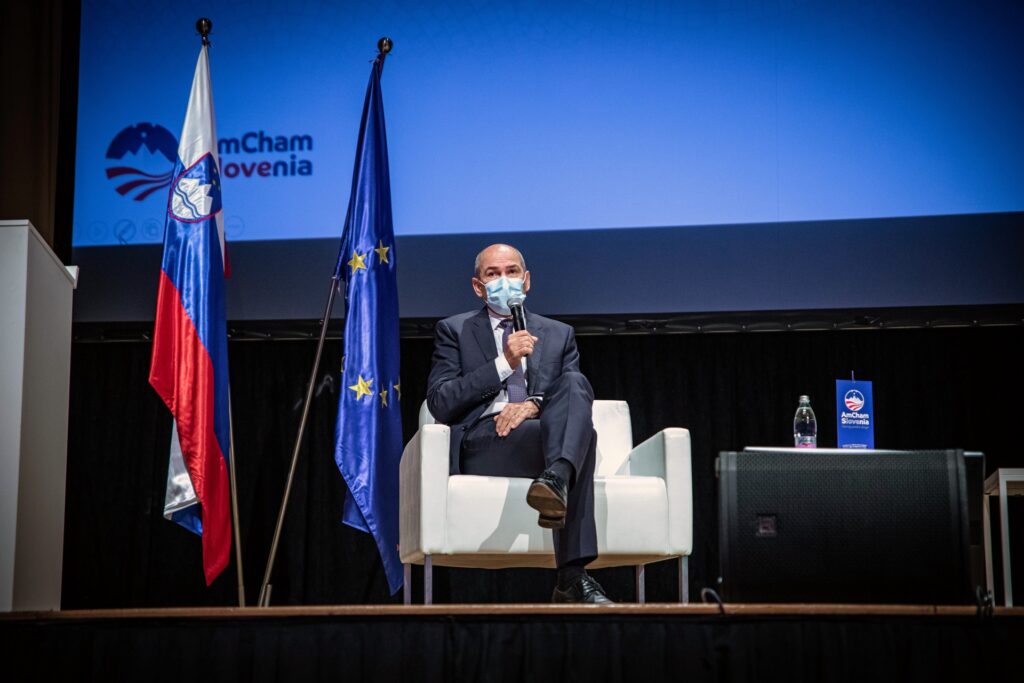Prime Minister Janez Janša was a guest at the AmCham business breakfast, which took place in Ljubljana on September 29th, 2020. The topics of conversation were related to the further economic development of Slovenia, Slovenia’s role in the EU, and transatlantic integration.
In a conversation that took place at the business breakfast of the American Chamber of Commerce in Slovenia (AmCham Slovenia), which was dedicated to strategic issues and challenges of further development of Slovenia and its position in the EU and the international community, Prime Minister Janez Janša also answered the question of why the measures are currently not as harsh as they were in the spring, even though the number of infections is higher.
Janša explained that the government’s instructions were drafted in a way that allowed for the work to continue normally, wherever they were able to organize the process in accordance with the rules for the new situation. As a result, the economic consequences of the epidemic in Slovenia are about one percent milder than the European average. “This is also a sign that the economy in Slovenia is healthy,” Slovenian Prime Minister Janša told the audience that was gathered at the event. Slovenia was also one of the few countries that did not roughly stop the operating of the industry during the spring wave of the epidemic. “I commend the Slovenian economy for its operating during the spring part of the epidemic,” Janša thanked all those present.
In the conversation, Prime Minister Janez Janša pointed out that the previous left-wing governments had given up on the actual problems and chose to wage a political war instead. The current government is trying to realize the commitments from the coalition agreement, as they want to break the mentality that problems are always being sought out in Slovenia, and nothing can be done. The central points of the coalition agreement are the de-bureaucratization and decentralization of Slovenia. “We are looking for solutions and ways of doing something,” says Janša.
De-bureaucratization and decentralization are key
During the second wave of the coronavirus epidemic, Janša warns of non-compliance with the rules of the leading health experts and government decrees. As our media outlet has already reported in the past, the opposition presented every possible government measure, even if it was very sensible, as fascism. Janša also pointed this out, as the critical limits in the measures are determined by the capacities of Slovenian healthcare. There would be far fewer problems if the citizens downloaded the Stay Healthy app and if the measures were strictly being followed. Instead, any government action was instantly portrayed as harmful.
Janša then pointed out the importance of private investments. Practice shows that with the direct interest of a private investor, projects are carried out more rationally and faster and achieve their purpose. Janša also pointed out that his government is not trying to ignore the money obtained from the European funds. The goal of the current government is “to invest the European funds productively.”
The current government has established the demographic fund, which has been the topic of discussion in Slovenia for the last fifteen years
The current government has also managed to establish the demographic fund. According to Janša, the establishment of the demographic fund means providing a framework for the state property not to melt away. “The fund will operate transparently. We have been talking about the demographic fund for the last 15 years, and now, for the first time, we have reached an agreement to simplify, rationalize it, and make it transparent.”
At the end of the meeting, Janša touched on the relations between the European Union and the United States. As far as the European Union is concerned, Janša believes that after all the shocks we have experienced recently, stabilization is urgently needed. Therefore, at the beginning of spring, the Slovenian government wrote down two priorities, with the help of Germany and Portugal: “These priorities are the development of a strategic plan for defence against pandemics and defence against cyber attacks.”
Janša believes that the EU and the United States of America represent a whole, in terms of values and economics. Slovenia will continue to be a close economic and military ally of the United States. This was also confirmed by the visit of the US Secretary of State, Mike Pompeo, who was the first Secretary of State to visit Slovenia in the last 23 years. At the end of the conversation, Janša said that “our alliance in NATO is also taken seriously.”
Luka Perš


